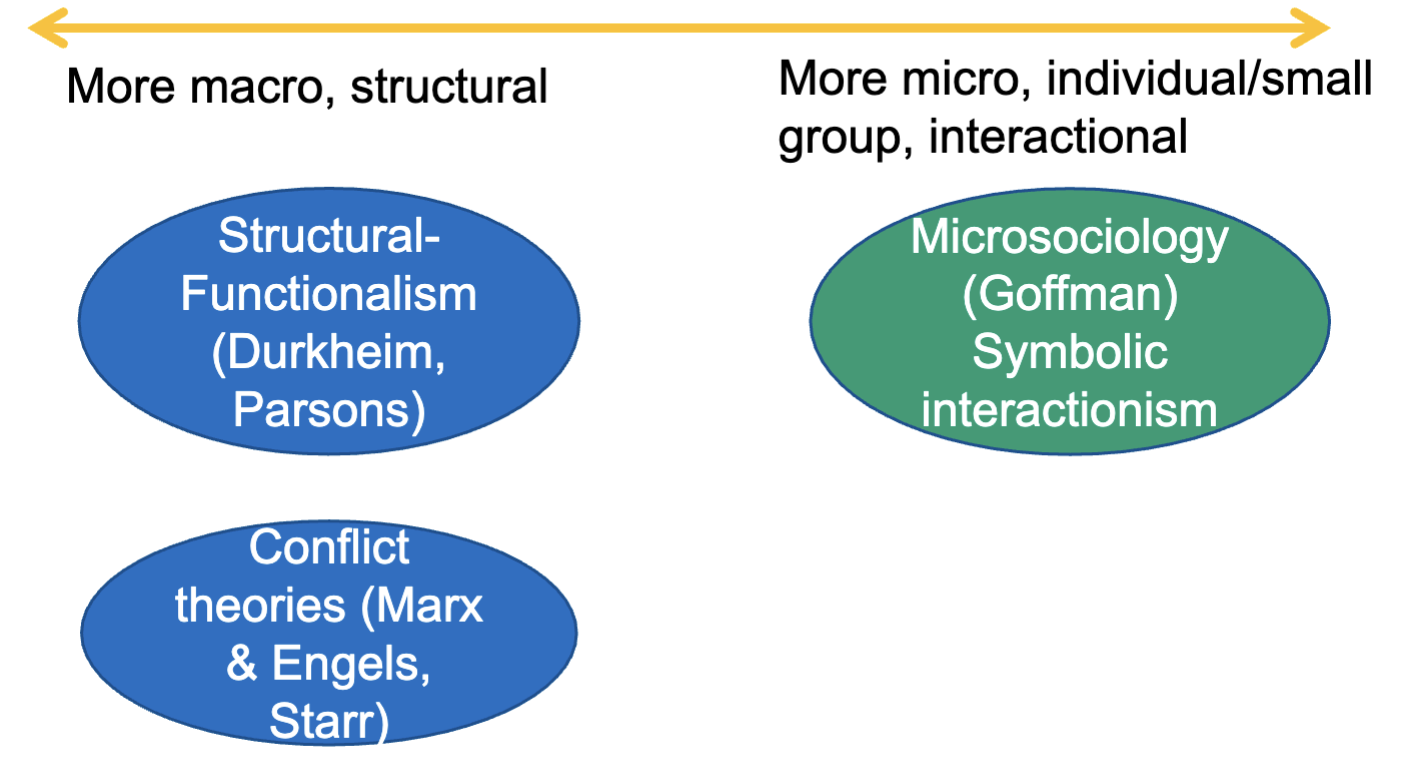21 January: Structuralism & Functionalism– social facts & social order
1/16
There's no tags or description
Looks like no tags are added yet.
Name | Mastery | Learn | Test | Matching | Spaced | Call with Kai |
|---|
No analytics yet
Send a link to your students to track their progress
17 Terms
Key concepts in review
Functionalism (9A), structuralism
Social facts & social currents
Durkheim’s research on suicide & types of suicide
Illness as deviance
Sick role (definition, rights & duties) (9A)
Micro and macro approaches to understanding society
More Macro:
Durkheim and Parsons - Structural-Functionalism
Marx & Engels, Starr - Conflict theories
More Micro:
Goffman - Microsociology, Symbolic interactionism

Durkheim & social facts
Durkheim was a student of August Comte, who called sociology the “queen of the sciences” (natural sciences was king) – Comte was a positivist, tried to generate a “physics of society”
Durkheim’s approach also applied natural science universalist “law-like” thinking to society, but was a bit more flexible, embracing evolution & functionalism
A major contribution was Durkheim’s concept of social facts – product of the collective & a structural force on individuals – “ways of acting, thinking and feeling, external to the individual, and endowed with a power of coercion, by which they control him” – Durkheim p. 3
“Physics of society”
regular universal laws on how society works
Social Facts
Durkheim concept
product of the collective & a structural force on individuals – “ways of acting, thinking and feeling, external to the individual, and endowed with a power of coercion, by which they control him” – Durkheim p. 3
More than a “sum of the parts thing” in society that continues to regulate people against/or along their will
What are social facts?
Collective representations, like religious beliefs & institutions, traditions, cultural ideas like legends, myths
Collective habits, like public opinion or mass behavior
Social morphologies, the “shape” of societies in terms of characteristics & forms of their institutions, including:
Religion
Language
Economy
Political system
Patterned, but not universal... can vary across groups, time, etc.
Social facts are emergent phenomena arising from _______ of individuals
Social facts are emergent phenomena arising from collectivity of individuals
Society is more than a collection of individuals & actions they take of their own free wills
A collection of individuals gives rise to something more than the individual themselves (“whole is more than the sum of its parts”)
People like to imitate each other
Durkheim → “no; powerful thing (social facts) exerts its force on people / influences them whether or not they like it”
Way of thinking counters “...zealous partisans of absolute individualism” – Durkheim p. 4 (counter to rational actor theory)
Durkheim argues that sociology is different from biology or psychology
Zealous partisans of absolute individualism (against Social Facts/ Durkheim’s theory)
Idea that complete free will determines behaviors rather than free will constrained by social facts
Durkheim argues that sociology is different from biology or psychology – how?
Biology - body
Psychology - what’s going on in a brain
Sociologists (Durkheim) - society as an organism
Social currents
These are like social facts, but without so much history, institutionalization, crystallization...
More mindless by comparison: “great movements of enthusiasm”
According to Durkheim can make people act contrary to their nature – in ways that even horrify them after the fact – what you do as part of a group may differ from what you’d do on your own
Can compel you to do things
What you do as part of a group can be different from what you would do when alone
Ex: people in protests acting violently (negative)
Example: Collective effervescence - an emergent feeling of group euphoria
Ex: A non football fan may be influenced to be excited by a game when they’re in a stadium
Collective effervescence
An emergent feeling of group euphoria
Ex: A non football fan may be influenced to be excited by a game when they’re in a stadium
Social facts – and social structures more generally – exist …
Social facts – and social structures more generally – exist prior to your birth
They have “power of external coercion” to sanction individual efforts that violate social norms (even if they aren’t “the law”)
Will push against you if you act against the norm, even if it’s’ not against the law
Everyone is a product of their society, and is made so through socialization/education (more later in term)
FYI for comparison with conflict theory next lecture: structuralism good at explaining patterns & regularity, but critiqued for not being very good at explaining social change (and ignoring individual difference, covered when we talk about status and inequality next week)
Social facts - “Will push against you if you act against the norm, even if it’s’ not against the law” example
Ex: speaking your own invented language, would find trouble communicating with people ; run into problems that will push you to return to the norm (speak an actual language)